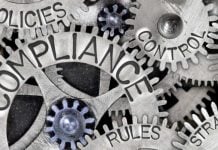While sports betting and igaming markets across the U.S. may be maturing, there is no sign that the compliance requirements for operators and suppliers will become any less complex. With that in mind, SBC Americas caught up with Cameron Conn, CEO of OneComply, to discover how technology can help to simplify internal compliance processes.
SBC: With a number of U.S. regulated markets having been open long enough for operators to have assessed what their biggest pain points are, could you tell us about the main licensing and compliance challenges your clients have identified?

Cameron Conn: First off, creating an application for a gaming license is an arduous task, especially when you’re entering several different jurisdictions, and right off the bat, OneComply helps immensely in streamlining and automating the application creation process. However, the real challenge for our clients is that getting the license is really just the start of the marathon of being a licensed entity.
So, with OneComply, the process of using our platform to create an application also plays a critical role in readying the company for fulfilling the ongoing compliance requirements of being licensed. A lot of these requirements are driven by the data points already captured in OneComply, as part of the entity and personal disclosure process, and we utilize all this data – along with automated reporting, monitoring and workflows – to ensure that companies can effectively fulfill their ongoing compliance obligations. This is where OneComply really provides incredible value to our customers.
Another challenge our clients face is every time they submit a license application, they’ll inevitably get a request from the state regulator or investigator to provide more information. This normally requires the licensing staff to manually begin the process of finding, or asking for, all the requested information, copying the files, organizing them into folders, and then uploading all the information to a file sharing site like Dropbox.
OneComply has solved this problem, with the ability for clients to securely share files from right inside their OneComply portal, since virtually all of the information is already there as part of their disclosure process. They just have to copy all the requested information into a new folder, then share only that folder with the regulator or investigator. It’s simple, fast and highly secure.
In fact, multiple states are now allowing our clients to share the data in their OneComply portal with them, in order to conduct their online license investigations.
SBC: Compliance in gaming covers a lot of areas, particularly when operating in multiple states and jurisdictions where the rules are different. What advice can you offer operators for managing the process of remaining fully compliant in all their markets?
CC: Whether you’re operating in the online or bricks-and-mortar side of gaming, compliance touches virtually every employee in your organization plus all of your suppliers and vendors. Online gaming and sports betting in particular has fast become a highly-interrelated industry, where your license can be impacted by your partner’s or vendor’s non-compliance.
So an important piece of advice that I can offer is to encourage all gaming organizations to build a culture of compliance in their organization. Make compliance a part of every employee’s onboarding process and emphasize the role they play in ensuring their organization is able to protect its most valuable asset: their gaming license.
Make sure they know what compliance means, not only in their job but throughout the entire organization. But also make sure to provide them the knowledge, tools and mechanisms to monitor and report questionable practices or compliance issues.
SBC: Technology now exists to help identify incidences of non-compliance and provide early warning signs for areas of concern. No system can ever fully replace the experience and knowledge of skilled professionals, so where does the balance between human and technological input lie?
CC: There are many compliance tools that gaming companies use, like whistleblowing tools, AML/KYC systems, underlying technology like geolocation, and monitoring tools to keep track of affiliate advertising. In fact, everytime I look at an awards shortlist of best compliance tools, I’m amazed at the range of solutions that are considered part of gaming compliance.
However, most of these solutions are standalone, so each of these types of solutions are siloed away, with the responsibility for monitoring them with several different people or departments.
With OneComply, we’re taking a 360° approach to licensing and compliance management by integrating several technologies – a secure data repository, workflow management, visual dashboards, license application automation, and API integration – into a single purpose-built platform designed specifically for the gaming industry. Of course, our solution requires the involvement of the licensing and compliance staff, but by having everything centralized under one platform, the entire process is streamlined and easily managed with many of the repetitive tasks automated.
And importantly, our platform also includes the ability to integrate other compliance tools into it – for example, a whistleblower tool or an affiliate monitoring product – with these alerts showing up in OneComply, where a compliance workflow can be kicked off with accountability assigned and actions tracked so that the issue is effectively resolved.
SBC: OneComply offers a license control solution; how does that help your customers to keep on top of compliance issues?
CC: OneComply’s license control features provide a way to view and track all of a gaming company’s licensing and compliance issues in one place. For licensing, this means monitoring not only the business application, but also all the key person licensing, employee occupational licensing, and any product that has a compliance or licensing component to it. For example, you can track a product license expiration date, the business entity associated with the product, where it’s deployed, and the jurisdictions the product is approved.
Much of this functionality is done via visual license control dashboards that offer an ‘at-a-glance’ view of all licensing and compliance issues, including alerts from integrated third-party compliance systems. So it’s an easy way to provide visibility and oversight to stakeholders on all aspects of a company’s licensing and compliance.
SBC: Gazing into your crystal ball, do you think the fast pace of change in technology is likely to make the job of an operator’s compliance team more challenging or will it enable ever more effective compliance systems to be developed?
CC: New gaming technology is happening at a rapid pace and it’s not only challenging for operators to manage its implementation and maintain compliance requirements, but for the regulators who need to assess if their current regulations can deal with it or whether they need to create a whole new set of regulations.
From a compliance perspective, it’s important to arm your compliance and licensing stakeholders with the same level of advanced, purpose-built technology that other departments in the organization already have available. One that all key stakeholders can access and rally around, that provides structure and visibility into the entire licensing and compliance process, and can be the control center to ensure nothing falls through the cracks.
It’s fighting fire with fire – organizations need to implement innovative compliance solutions to help manage the increased compliance requirements brought about by the expansion of gaming and new technologies.
——————————–
OneComply will tackle many of these licensing and compliance issues in the upcoming webinar ‘Gaming industry fines – how they can be prevented and what they mean for the future’.
Cameron Conn will be joined by Peter Murray (Head of Gaming, Veriff), Maria Cobos (Head of Compliance, USAbility Digital) and Ron Kammerzell (President, Kammerzell Consulting and former regulator, Colorado Division of Gaming) for the webinar on Oct. 4th at 9.00 PST / 12:00 EST. Click here to register.














